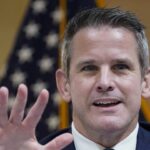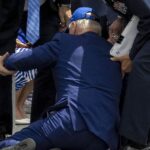The Bipartisan Safer Communities Act may have opened the door on closing the so-called gun store loophole, but most of what it was intended to do went well beyond that. It definitively made it illegal for some people to buy a gun, people who could have done so before.
This was touted as absolutely essential in curbing the scourge of gun violence sweeping the nation as well as somehow reducing mass shootings.
The law was passed a couple of years ago and did things like require more in-depth background checks for younger gun buyers and expand the list of prohibiting offenses.
But has it done much of anything?
Based on what I’m seeing in a report from the White House, one has to ask questions.
More than 500 people — some linked to transnational cartels and organized crime rings — have been charged with gun trafficking and other crimes under the landmark gun safety legislation President Joe Biden signed two years ago Tuesday.
A White House report obtained by The Associated Press on the implementation of the Bipartisan Safer Communities Act also said that enhanced background checks under the new law have stopped roughly 800 sales of firearms to people under age 21 who would be prohibited from buying them.
It highlights that 14 states are using or planning to use funding from the legislation to make better use of red flag laws, which allow law enforcement to remove weapons from people in crisis but are often underused or not well understood. And the report lays out how $85 million in funding has been awarded to 125 school districts across 18 states to help identify students who need mental health care and help them access it.
Now, let’s break these numbers down for a moment.
500 people were arrested in a nation of more than 330 million people. I’m not entirely sure you can chalk all of that up to any act going into effect since it looks a lot like statistical noise. The report doesn’t say how this law was necessary to stop cartel members from other countries from buying guns, which was already illegal, either.
As for the 800 people prohibited from buying guns, I have questions. First, do we know they were truly prevented from buying a firearm or did they go to the black market and get one after being denied? How many of those background checks prohibited innocent people from getting guns because of some confusion at NICS? It happens more often than many realize, after all, so there’s no reason to believe it can’t happen here.
Again, though, this is a country of 330 million people. This may sound like a lot of people being prevented from buying a gun, but if you’re looking at our violent crime rate as a whole, this is nothing. This isn’t even a drop in the proverbial bucket.
But for any innocent people barred from buying a gun due to a mistake, it’s a big deal. They’re now left trying to figure out how to protect themselves as they also try to figure out how to fix their data in NICS.
The White House brags about 14 states spending money to promote their “red flag” laws, but there are 21 states (and the District of Columbia) that have those laws in place. One-third of the states that have Extreme Risk Protection Orders in place aren’t even applying for the “free” federal funds to expand their use. That’s hardly a sign of success.
Look, I get that Biden needs the BSCA to be a win, but this has had a minimal impact at best based on the White House’s own report. They can try to spin it like it is, but that’s not really going to fly with these numbers.


